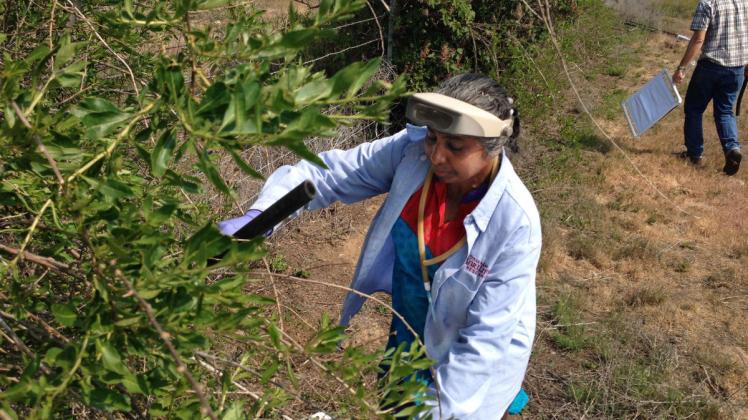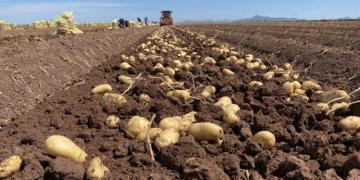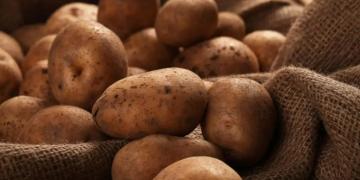EEUU: A potato chip nobody wants
Researchers on lookout for potato psyllid, a new pest that could infect crop with zebra chip, which has wiped out entire fields in other parts of the world

PROSSER — As a warm morning grows warmer along Gap Road north of town, Jenita Thinakaran and Rodney Cooper whack a stringy patch of matrimony vine with 2-foot sections of rubber hose, catching leaves, dust and bugs on white screens.
The U.S. Department of Agriculture researchers then inspect the surfaces for potato psyllids, a new pest that has the potential to harm the Northwest potato crop.
Cooper spots one, pointing to a tiny green insect crawling across his white screen.
"This is a newly emerged potato psyllid adult, and this is exactly what we’re looking for, because this is evidence that it overwintered on these plants," said Cooper, a research entomologist with the USDA’s Agricultural Research Service laboratory in Wapato.
Thinakaran is a post-doctoral research associate at the same facility. They have teamed up to literally beat the bushes to find the pesky bugs’ winter hiding spots.
The potato psyllid is another agricultural pest new to the area that could, if left unchecked, damage the state’s crops and throw off growers’ Integrated Pest Management, a delicate balance of timing, biological controls and targeted spraying to control bugs. The same worry surrounds the Brown Marmorated stink bug, the spotted wing drosophila and other newly arrived bugs that could upend years of balance in the Yakima Valley’s fruit orchards.
Potato psyllids don’t eat potato plants. That’s not the problem.
The bugs, however, sometimes carry a bacteria that causes zebra chip disease, a brown, streaky condition inside the flesh of the tubers most noticeable after they’ve been sliced and fried, such as for potato chips. Researchers don’t believe the infected potatoes pose any health threat, but farmers know customers won’t buy them.
Research is underway, but the stakes could be high.
The disease shows up in several countries around the world. In New Zealand, zebra chip cost growers $22.5 million in 2010 and 2011, according to a 2012 paper by Joseph Munyaneza, a Wapato laboratory colleague of the two researchers. In northern Mexico, zebra chip has been known to wipe out 60 percent of the crop, forcing farmers to abandon entire fields. Tomato and pepper farmers throughout the world have noticed crop losses due to the same bacteria.
In the United States, growers spend an average of $300 per acre to spray for the psyllid, while the Texas industry estimates about $25 million worth of potatoes a year are at risk. In controlled field trials, crop loss has sometimes reached 93 percent, Munyaneza reported.
For 20 years, the disease has been creeping north into Texas, California and other southern and central states, Munyaneza said. However, in September 2011, farmers began finding zebra chip in Idaho, Washington and Oregon, the three states that produce half of the nation’s potatoes.
In 2013, Washington ranked second behind only Idaho in production, while the starchy tubers were Washington’s fourth-most valuable crop at $792 million, according to USDA statistics.
Damage has stayed close to the Columbia River, near Paterson, Kennewick and Pasco, said Robert Halvorson Jr., who grows potatoes in the Lower Valley.
"We haven’t noticed the impact," said the Yakima resident and a commissioner for the Washington State Potato Commission.
Potatoes are big for the state, but not so much for the Yakima Valley.
In 2012, the year of the most recent USDA crop census, Yakima County had 1,691 acres of potatoes, a far cry from the tens of thousands in the Columbia Basin counties of Grant, Benton and Franklin, known for sandier soil that’s easier to irrigate and cool for a longer growing season, Halvorson said. Grant County alone grows 45,494 acres, 28 percent of the state’s total of 163,925.
Also, Lower Valley growers harvest earlier, sometimes in early July, before the disease shows up, Halvorson said, while most of the potatoes grown in the Yakima Valley are sold on the fresh market, making zebra chip less of a concern than for processed potatoes.
"Fortunately that’s the one good thing about being here," he said.
In a potentially alarming find, researchers began noticing that psyllids were living in the Northwest throughout the winter, instead of dying off in the fall, giving them the potential to dramatically boost in population each spring.
"The previous school of thought was that these psyllids are coming in from Texas and California" each year, Thinakaran said.
They are. Each spring, the tiny bugs take to the air currents and fly north, said Thinakaran, who previously worked in Texas. "By March, they are all gone," she recalled. "I can’t find a single psyllid."
However, she and Cooper believe two invasive vines imported from Asia and Europe, the matrimony vine and bittersweet nightshade, are acting as year-round hosts for the potato psyllid in the Northwest. Nightshade appears most often as a volunteer near rivers and creeks, while the more drought-tolerant matrimony vine usually has been planted deliberately along fence lines and homes, Thinakaran said.
Cooper first suspected psyllids were hiding in matrimony vine while searching a stand at a bend in Selah Loop Road near his home during a walk one evening.
The psyllids he and Thinakaran have been finding on the two vines have tested negative for Candidatus Liberibacter solanacearum, the bacteria that causes zebra chip.
That would be good news, if the results hold, Thinakaran said. It would mean that only the migrating psyllids cause zebra chip, and local farmers would not have to start hunting and killing the two vines to protect their crops.
But they keep looking, using their rubber beaters and trays, as well as a special vacuum to slurp bugs off plants through a filter. It looks like a leaf blower that sucks instead of blows.
"We’ll take these psyllids back to the lab and we’ll run more tests to see if this vine or this plant is actually an important source of psyllids that growers need to worry about," Cooper said.
Fuente: http://www.yakimaherald.com/news/local/a-potato-chip-nobody-wants/article_26cab836-fd23-11e4-ac83-4baa3753cc81.html




